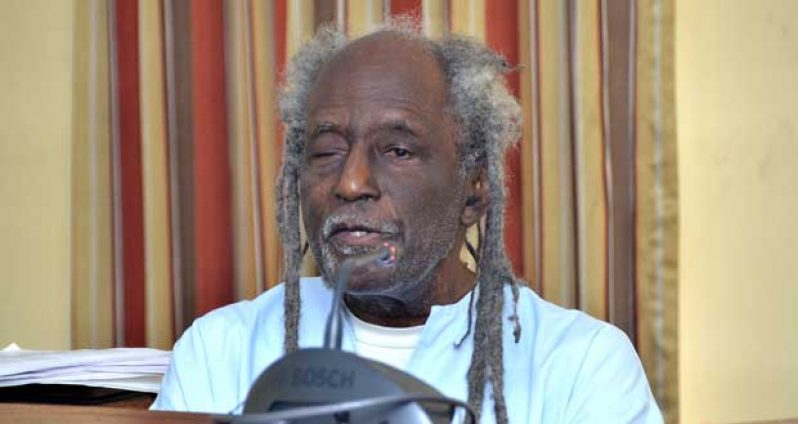…so that when he was killed they would say he had planned to bomb the prison
UPON resumption yesterday, the Commission of Inquiry into the death of former historian/politician Dr. Walter Rodney, heard how the state had arranged for a more “hospitable scene” by removing armed guards and a mobile police outpost around the prison area where Rodney was assassinated.
This was done so that when Rodney was assassinated, it would say that he was planning to bomb the prison
Eighty-nine-year-old Eusi Kwayana, one of the founders of the Working People’s Alliance (WPA) who now resides in San Diego, California, United States, was called to the witness stand yesterday.
The COI resumed in the Supreme Court Law Library following the first four-day session which was concluded earlier this month. The second session of public hearings, according to Chairman of the COI Richard Cheltenham, is expected to run from May 27 to June 6.
According to Kwayana, he was at his Buxton, East Coast Demerara home when he got the “terrible news” of Rodney’s death in the middle of the night by another party member, Dr. Rupert Roopnarine.
Following this, he said he, along with a team of other party members, went to the Camp Street prison block in Georgetown and interviewed residents and businesses about police presence in the area during the days leading up to Rodney’s death.
He explained that the team found out that four armed guards were stationed at this location, one at each corner of the prison. According to the residents, Kwayana said, there was also a mobile police outpost that was usually in Bent Street.
In the days leading up to Rodney’s death, however, Kwayana said all of the guards as well as the police outpost had been removed. Elements of the State and the security force therefore were in expectation that something was about to happen, Kwayana said.
“If this was true, then this tied the State in to the crime because the State had been instructed to arrange a more hospitable scene, to make it more inviting for the bombing,” Kwayana remarked.
According to Kwayana, the entire country was looking forward to Rodney’s presence even before he arrived in Guyana.
But there was spite, fear and hostility towards Rodney even before he returned to Guyana. In fact, he said the PNC was setting the scene to paint Rodney as a troublemaker even before he landed in Guyana.
Behind this was a spirit of ethnic insecurity, political bankruptcy and no real respect for the right to life, Kwayana testified.
Speaking about the atmosphere that pervaded around the time of Rodney’s return, Kwayana said the population was under severe restraint. No printer would print any other newspaper because of fear of the government. The public media was government-controlled.
“Freedom was closing down,” he said, and whoever held public meetings and protests in favour of Rodney suffered resentment from the government. The House of Israel, for instance, became a “street force” for the regime at that time.
(By Telesha Ramnarine)




.png)









